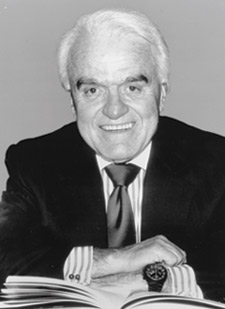 1. You received a lifetime honorary membership in the DGA in 2001. What did that mean to you?
1. You received a lifetime honorary membership in the DGA in 2001. What did that mean to you?
A lot. To me one of the prime enticements of being in the film industry was the opportunity to meet and spend time with the greatest cinema icons in the world. I began my tenure in 1966 and in the generations that followed I got to know George Stevens, Billy Wilder, William Wyler, David Lean to Steven Spielberg to the newest such as Steven Soderbergh and Paul Thomas Anderson. So, to have honorary membership in the DGA was, for me, not only a glittering prize, it also allowed me to claim 'kinship' with creative directors. Smile if you wish, but that's what I feel.
2. How did the DGA and the MPAA work together to pioneer efforts to combat piracy?
From my first day at the MPAA, I made it my policy to frequently meet with the DGA to gain their ideas about what ought to be done in a number of areas. Piracy was one difficult issue that the DGA and particularly the Guild's Jay Roth understood with great clarity. MPAA and DGA worked with seamless harmony to combat this blight.
3. Both the DGA and the MPAA have a long history in opposing censorship. What do you see as current threats in that area?
Unhappily, too many in this free and loving land are not partisans of the First amendment, the one clause in the Constitution that guarantees all others. Freedom of speech must always be defended because, as someone once said, like virtue it is always besieged. I don't know of any group that tends that amendment with more fervor than the DGA.
4. Throughout the years there have been attacks made by independent filmmakers that the ratings system was more tolerant with studio pictures. Can you comment on that?
Studio picture producers often claim that the ratings system caters more to independent productions than to theirs. It all depends, as my old boss LBJ used to say, "on whose ox is being gored." No system endures that plays favorites, one over the other. The ratings system plays it straight, or else it would have collapsed long ago.
5. Similarly, it has been claimed by directors that the MPAA was more lenient with violence than sex. Do you think that's fair?
The short answer is NO, that's not a fair conclusion. The fact is violence is multifaceted. There are so many ways to depict violence. Sexual scenes are, how shall I say this, more easily defined. Moreover, oftentimes a director will, by his or her volition, revise a violent scene but is less apt to do so in a sensual scene. What is too much violence? The courts have no ready answer. Indeed, the Supreme Court to this hour cannot define pornography.
6. Would you ever get calls from directors asking for advice about what they could and couldn't include in their movies to get a particular rating?
Sure. But I always said, 'I don't rate movies. I never countermand a rating issued by the Rating Board. Let your story be told the way you want to tell it. Then if you have a dissent, talk to the chairman of the Rating Board. You'll be treated fairly.' I'm not saying this always got a favorable response, but it was an honest answer.
7. A lot has changed since you first founded the ratings system. Is there anything you would revise about it today?
Not really. Nothing endures in any marketplace for almost 40 years unless it is doing something beneficial to the people who use it. Parents don't judge it to be perfect, but in an imperfect world they use it and trust it. The prime asset of the system is its simplicity. Anything voluminous or complex is antagonistic to everyday usefulness. The last Opinion Research Corporation's nationwide poll taken in August-September 2006 revealed that 80 percent of parents find the system 'Very Useful to Fairly Useful' in helping decide their young children's movie viewing. That's a huge parental approval. I don't know of anyone in public life who has an 80 percent approval level.
8. In 2002, you joined the DGA in speaking out against the unauthorized editing of films. What was your position on that?
The DGA took the leadership role in this issue. I counted the actions of those who would impose their editing judgment on movies without the express permission of the director to be an outrage.
9. In recent years the Internet has become a battleground. How do you reconcile the rights of free speech alongside the need to protect intellectual property?
The government should never try to intervene in speech guaranteed by the Constitution. Never. Remember, when a tyrant first appears he always comes as your protector. There is a clear dividing line between speech and theft. Speech is guarded by the First Amendment. Thievery is not.
10. In your 38-year reign as head of the MPAA, what would you say was the DGA's greatest accomplishment?
Over my long tenure in Hollywood, the greatest achievement of the DGA is its disciplined, thoughtful and consistent approach to problems that erupt from time to time in our industry. Through the years, the members of the DGA boards, its presidents and executive directors have always managed to find common ground with the production community and keep the industry working, no matter how thorny and riven with controversy the issues at hand.